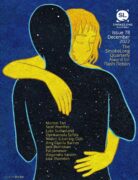Your story feels like an elegy for faith. Your narrator doesn’t want to lose faith in her mother—she actively searches for a way to keep believing her mother’s lies. Of course, we know where that’s headed—the clash happens off-page, off-camera. How much of that inevitable fallout happens for you while you are writing?
My writing might be overall described as a series of inevitable fallouts. Some of that clash off-page may be before motherhood—as the backstory, that’s hard to share in a small flash space. While the more unreliable child narrator is telling the story here, she’s also not telling it with solid knowledge of what happened earlier in her mother’s life. The mother has kept the pre-clashes—the life effects leading to the current behavior—away from the child. Only the current events and news events and her mother’s love despite the current issues are what the narrator knows. However, I did write in little cracks beginning to appear in how the narrator perceives her mother.
The reader might guess where things are headed but there are questions I’ve left unwritten, literally and figuratively—how does this forced woman/child approach future motherhood? Does her childlike faith fully wear thin? I imagined what might happen after the ending—does the mother continue with wobbly lies to protect the narrator because she feels the stories are better than the truth?
Swinging into the deeps of structure—you structure into four very rhythmically pleasing stanzas, but the repetition of stanzaic phrasing ends, stranding us in the aftermath of belief, when truly believing becomes impossible. The free narration that follows feels like a release, but into what? It’s untethering, discombobulating, like getting lost at Gibson’s Discount Plaza as a child.
How would you describe your relationship with structure?
I have a loose relationship with structure, a love-hate battle because I know more traditional structure, but there’s also life’s structure where we’re labeled babies, toddlers, kids, adults, but that doesn’t mean kids are always truly kids or adults are adults. I think role switching in life structure has to be reflected in fiction’s structure, too.
I’m always fascinated by negative space, the parts of the story that don’t fit in the container. What more do you need to outside the confines of the story to write its best version?
I tried to make the unreliable narrator very reliable as a person, even as that flies in the face of being a child. She’s doing mother things even as she’s not really being mothered. The mother is also telling her half-truths in a somewhat isolated setting; the kids are home alone and forced into self-sufficiency.
There’s also a negative space where the mother becomes a victim, too. I set the story in stereotypical Main Street, USA. I usually write flash with limited active characters, which means there’s no one protecting or assisting the mother or kids. The news stories became a pseudo-parent because they’re reliable truths in the midst of a mother’s half-truths.
The mother’s lies are so clearly doomed by time—even the life expectancy of happy lies expires. Do you view the clues leading to the questions, and then the light dawning as catharsis, catastrophe, or something else? From the vantage point of longing for eternal longing, is it possible to reweave unraveled belief?
I tried to breadcrumb elements in the story. The child returns to news stories of actual catastrophes that mirror the ones her mother embellishes to explain her behaviors. While her mother sleeps, the narrator looks for something to believe in. By having the mother explain her lateness, the way she smells or is dressed with these events, I tried to include chaotic repetition with love.
Let’s talk about the title. The mother seems to be drowning. Is it the experience of hiding the truth of adult life (which she takes to extremes), the commonplace nature of desperation, or maybe the universal experience of running out childhood that makes this feel so Main Street?
The setting was about “Main Street, USA.” I imagined a small-town square and, perhaps, small-minded people. In a larger space, I would have added more backstory, details about this mother and children, descriptions of the house and surroundings, a woman with an absent husband and small children stumbling to provide. I decided to use sparser details to let readers parse how they read it. There’s also something desperate in the mother’s movements, like she’s trying to get out of this small-town trope.
In another sense, Main Street isn’t helping this family. The children are home alone. The mother is struggling/drowning, perhaps with alcoholism. I also tried to include glimmers of hope in the mother’s fanciful storytelling. And, at some point, the narrator has had a mother do traditional mothering things—putting sisters to bed, hanging out clothes, making dinner. The mother is trying her hardest but gets caught in harsh or overwhelming situations—literal and figurative drowning—but continues to try and make things better and continue loving the kids no matter what.
I also didn’t give the mother or children names or physical characteristics finding that the simple Mama works to represent families struggling with addiction, divorce, grief, loss, financial hardships. The mother and narrator are aware in their own capacities that things aren’t going right but both try to keep nurturing. The mother is overwhelmed, but she’s still trying to be a good mother, trying to overcome giant adversaries (literal and figurative) and always comes back home to love the children while the narrator faces growing up too fast but also still loves her mother. Both are drowning.
SmokeLong has a long tradition of asking at least one quirky, sort of fun question. In that spirit, what’s your favorite card game?
It’s kind of a card game (there are cards)—Settlers of Catan because it’s a tradition we play as a family when the college kid comes home. I win only when I’m trying to lose.



 The core workshop of SmokeLong Fitness is all in writing, so you can take part from anywhere at anytime. We are excited about creating a supportive, consistent and structured environment for flash writers to work on their craft in a community. We are thrilled and proud to say that our workshop participants have won, placed, or been listed in every major flash competition. Community works.
The core workshop of SmokeLong Fitness is all in writing, so you can take part from anywhere at anytime. We are excited about creating a supportive, consistent and structured environment for flash writers to work on their craft in a community. We are thrilled and proud to say that our workshop participants have won, placed, or been listed in every major flash competition. Community works.